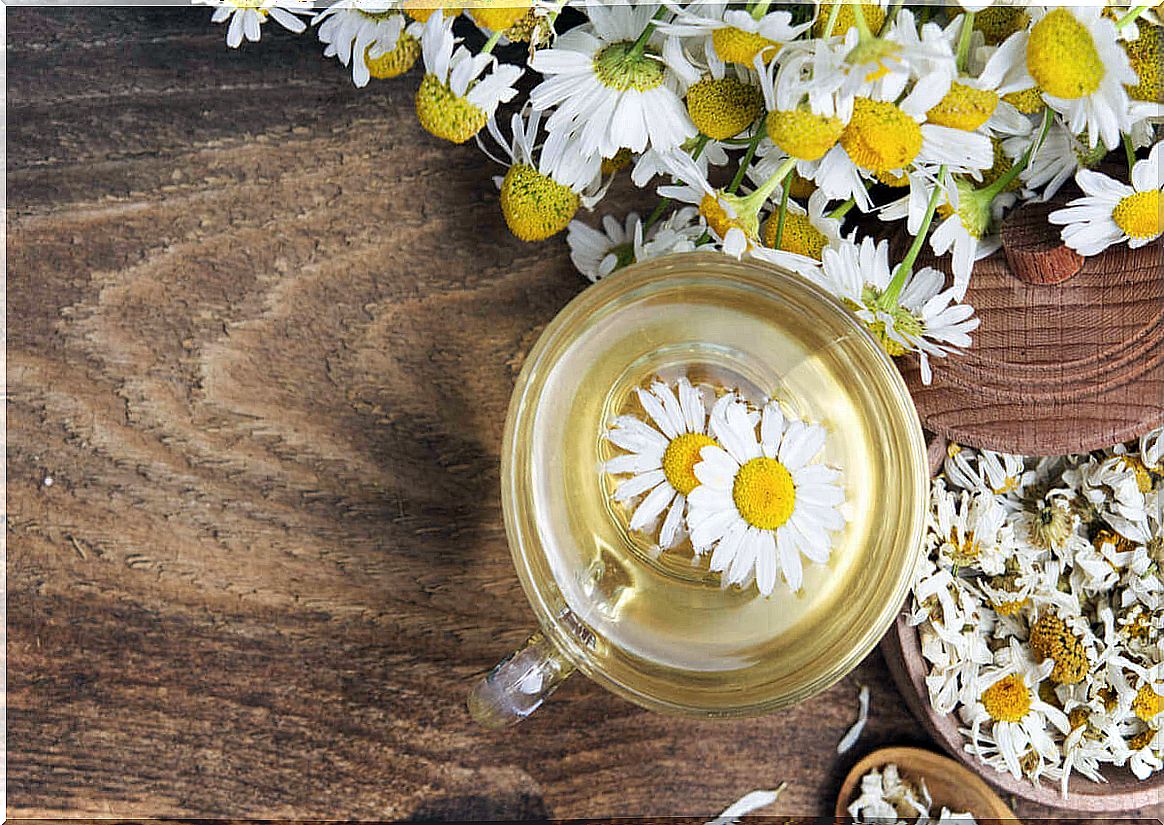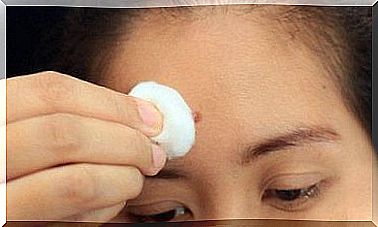The Properties And Benefits Of Chamomile Tea

Chamomile tea is a natural infusion that gained popularity due to its interesting medicinal uses. While much of its use comes from popular literature, there is now a wide range of research supporting the properties and benefits of chamomile tea.
The plant is part of the Asteraceae family and there are numerous species. The most common in tea preparation are Matricaria chamomilla and Matricaria nobilis. So what are the main properties and benefits of chamomile tea? Discover it today!
Properties of chamomile tea
We obtain chamomile tea by infusing the dried flowers of the plant with water. It is characterized by a slightly floral aroma and a mild taste that is pleasant in the mouth.
As we can see in an article published in Pharmacognosy Reviews, it also concentrates bioactive compounds with therapeutic potency. In particular, it contains substances such as:
- sesquiterpenes
- Flavonoids
- Coumarin
- Polyacetylenes
This composition, which brings together about 120 chemical components, gives the plant various health properties. So it is said that the tea, the plant extracts and also other presentations of chamomile have the following effect, among others:
- Antimicrobial
- Anti-inflammatory
- Antioxidant
- Anxiolytic
- Antispasmodic
The main benefits of chamomile tea

Chamomile tea plays a major role in popular medicine. Today, of course, we know that it should not be the first choice treatment for diseases. However, a number of people use it as an aid to relieve the symptoms of certain conditions. So what can you use it for?
1. Chamomile Tea Helps Soothe Menstrual Pain
The phenolic compounds in chamomile tea have an antispasmodic effect that promotes the relief of menstrual pain. In a study published in the Iranian Journal of Obstetrics, Gynecology, and Infertility, women who took this tea for a month were able to reduce the severity of dysmenorrhea.
At the same time, because it is a relaxing drink, the participants also reported less anxiety related to their periods. A number of hypotheses suggest that the plant reduces the production of prostaglandins, substances responsible for pain and inflammation. In both cases, more research is needed.
2. It Supports Healthy Digestion
The digestive properties of chamomile tea are perhaps the most well-known. For hundreds of years, people have been preparing this drink to soothe gastrointestinal discomforts such as flatulence, indigestion, diarrhea, nausea and vomiting.
There is still a limited amount of evidence in this regard. However, a systematic review in Electronic Physician Journal indicates that these effects are related to its antimicrobial, anti-inflammatory and relaxing potential.
3. It Promotes Better Sleep Quality
There is no natural herb that can fight sleep disorders on its own. Still, a number of plants, such as chamomile, serve as allies to help you sleep better. Due to the content of apigenin, a type of antioxidant, it stimulates the receptors in the brain and reduces insomnia.
In a study published in the Journal of Advanced Nursing, women who had just given birth who consumed chamomile tea for two weeks reported better sleep quality. They, in turn, showed fewer depressive symptoms associated with sleep problems.
4. It Helps Regulate Blood Glucose
Improving eating habits and lifestyle is critical to controlling blood glucose levels. However, in the case of occasional glucose increases, it is advisable to drink beverages such as chamomile tea.
Why is that? Studies suggest that plant extracts help stimulate the functions of the pancreas, the organ responsible for producing insulin.
The latter is the hormone responsible for regulating the sugar level in the body. And while the evidence is lacking, the findings are promising.
5. It Supports Heart Health Care
The antioxidants that chamomile tea contains (especially flavonoids) have a beneficial effect on heart health. Of course, this doesn’t mean it can replace medical treatment for heart disease. As part of a regular diet, it simply helps to reduce the risk of disease.
A small study published in the Journal of Endocrinological Investigation revealed benefits in people with diabetes who consumed chamomile tea with meals. These patients experienced improvements in their total cholesterol, triglyceride and bad cholesterol levels.
What other benefits does chamomile tea provide?
The use of chamomile in tea and other presentations has spread around the world. As a result, in addition to the advantages already mentioned, other advantages are attributed to the drink.
However, it’s important to note that many of these uses come from anecdotal data and lack scientific evidence:
- Anxiety and Depression: The calming properties of chamomile tea are beneficial against states of mental stress, such as anxiety and depression. While most use it in aromatherapy for this purpose, it is also useful in tea.
- Skin health: Topical application of chamomile tea has shown positive effects in calming skin symptoms such as irritation, redness and scaling. There are even people who use it for burns or problems like eczema.
- Colds: Inhaling the vapors of hot chamomile tea helps relieve nasal congestion and irritation caused by the common cold.
- Bone care: The evidence on drinking chamomile tea and preventing bone disease is still weak. Still, a number of hypotheses suggest that this drink has anti-estrogenic effects that help prevent the loss of bone density.
Who Should Avoid Chamomile Tea?

For most healthy adults, chamomile tea is safe to drink and therefore poses no risk. To date, there are also no reports of fatal or toxic side effects from ingesting this drink. However, it is not recommended in the following cases:
- A history of allergy to chamomile or plants in the daisy family.
- Previous pollen allergy personal data.
- People with chronic kidney or liver disease should consult their doctor.
- Infants and young children.
What about chamomile to remember?
Chamomile, either in tea or in other forms, serves as a supplement to improve the symptoms of certain conditions. However, it should not replace medical treatment for any reason.
If you want to consume this plant in tea, you can safely drink 2 or 3 cups a day. If there have been previous illnesses or if you are taking medication, it is best to consult your doctor.









